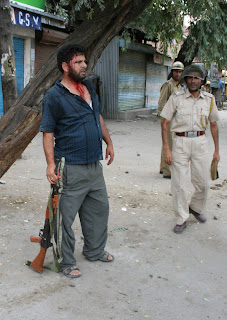If promises are made to be broken, then Kashmir may be summoned to prove the treacherous proposition. Broken promises haunt Kashmir's history, and explain its tragedy.
The United Nations Commission for India and Pakistan (UNCIP) passed a resolution on January 5, 1949 wherein it was agreed that “the question of the accession of the State of Jammu and Kashmir to India or Pakistan will be decided through the democratic method of a free and impartial plebiscite.” The resolution was negotiated with both India and Pakistan and accepted by all five members of the Commission, Argentina, Belgium, Columbia, Czechoslovakia and the United States. Professor Joseph Korbel, father of Dr. Madeleine Albright was the Chairman of the Commission at the time.
Sir Benegal Rama Rau, the Indian delegate spoke during the 399th meeting of the Security Council on January 13, 1949, “On behalf of my Government, I can give the assurance that it will not only cooperate to the utmost with the Commission itself towards a settlement in Kashmir, but also with the United Nations in securing peace everywhere, because it believes that this organization offers the only hope for peace for future generations, on a secure basis.”
Sir Rau further said at the Security Council on March 1, 1951, “The people of Kashmir are not mere chattels to be disposed of according to a rigid formula; their future must be decided on their own interest and in accordance with their own desires.”
Mr. Setalwad, another Indian delegate spoke during the 572nd meeting of the Security Council on January 31, 1952, “I was the first to declare that the people of Jammu and Kashmir should freely decide their own future.”
India, however, was soon undeceived of its delusions over Kashmir's political yearning. Recognizing that its people would never freely vote accession to India, it contrived excuse after excuse to frustrate a plebiscite.
With the lapse of British paramountcy on August 14, 1947, broken promises over Kashmir came not like single spies but in battalions, to borrow from Hamlet. Princely states enjoyed three options: accession to India, accession to Pakistan, or independence. But the choice, according to India's Prime Minister Jawaharlal Nehru and tacitly endorsed by the British, was to be made by popular referendum in cases where the creed of the ruler varied from the religion of the majority. That fundamental democratic principle had been sternly applied by Nehru with military means in Hyderabad and Junagadh where the rulers were Muslim but their inhabitants largely Hindu. Kashmir presented a converse case: the Maharaja was Hindu but the majority subscribed to Islam.
On November 2, 1947, Prime Minister Nehru reiterated, “We have declared that the fate of Kashmir is ultimately to be decided by the people. That pledge we have given and the Maharaja supported it, not only to the people of Kashmir but to the world. We will not and cannot back out of it."
In recent past, Dr. Manmohan Singh, the Prime Minister of India and General Pervez Musharraf, the President of Pakistan agreed at the United Nations on September 24, 2004 “to explore all the possible options to settle the issue of Kashmir.” Then exactly one year later, Prime Minister said at the United Nations on September 16, 2005, “What I do believe, I have also said that borders cannot be redrawn but we must work together to make borders irrelevant.” One fails to understand how can you explore all possible options when the only option available is to make borders irrelevant (status quo).
On September 5, 2005, Dr. Manmohan Singh promised Mirwaiz Umar Farooq, Chairman, All Parties Hurriyet Conference that India will have zero tolerance on the human rights violations in Kashmir. Then he responded while replying to a question during a press conference in New York that “The fact that there is so much of violence (in Kashmir), the fact that cross border infiltration continues, the terrorists are active, does impose some burden on the ordinary citizens.”
The train of broken promises over Kashmir might be forgiven if the consequences were innocuous or inconsequential. But I submit the opposite is the case. India exerts an iron-fisted rule over Kashmir. With approximately 700,000 military and paramilitary troops in the territory, gruesome human rights violations are perpetrated with. Torture, rape, plunder, abduction, arson, custodial disappearances, arbitrary detentions, and ruthless suppression of peaceful political dissent have become commonplaces.
Let us hope that the last promise over Kashmir has been broken.
.jpg)
.jpg)








